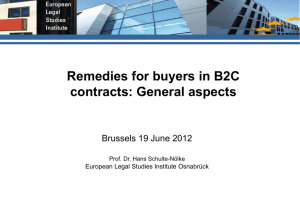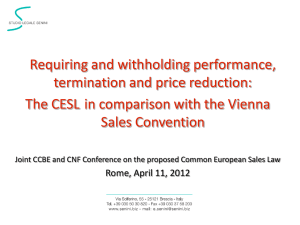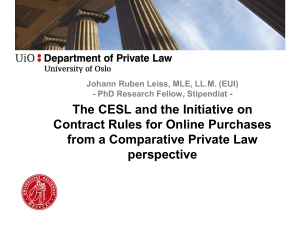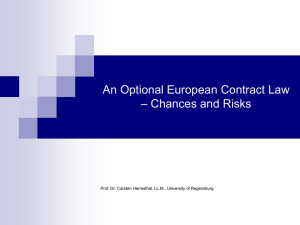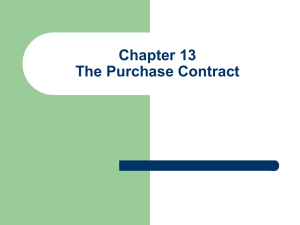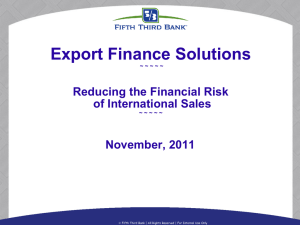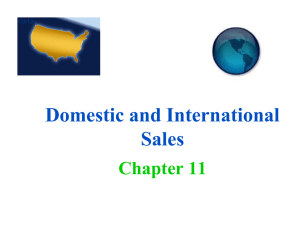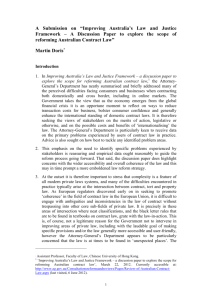goods
advertisement
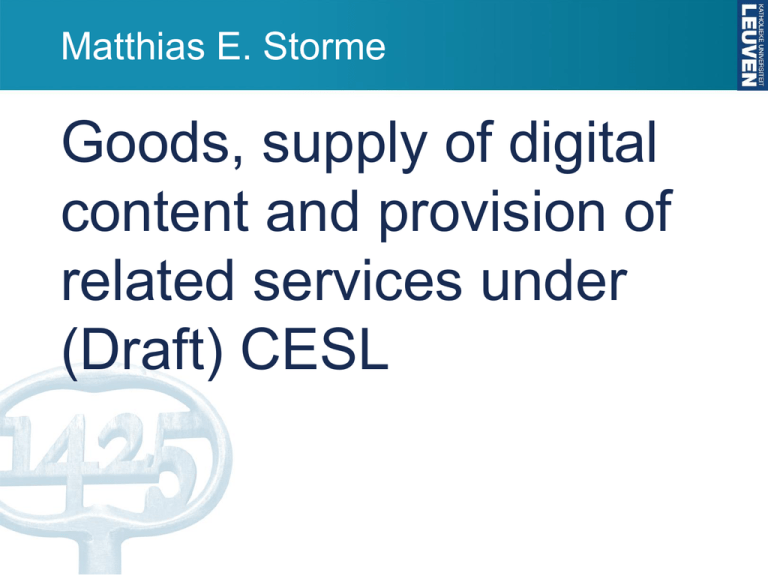
Matthias E. Storme Goods, supply of digital content and provision of related services under (Draft) CESL CESL can be used for (Art. 5 Reg.) 3 types of contract or a combination of them: a) sales contracts b) contracts for the supply of digital content c) related service contracts Not for contracts including other elements than those 3 Excluded in case of consumer credit incl. in the form of deferred payment SALES CONTRACT = contract for the transfer of ownership of goods for a price (art. 2 k Reg.) GOODS = tangible movable items (2 h Reg.) Sale includes provision of (movable) goods to be manufactured ! Also if according to the buyer’s specifications ? Probably (under CISG and CRD 2011/83 covered) DIGITAL CONTENT (defined in art. 2 j Reg.) = Data produced and supplied in digital form - whether or not according to buyer’s specifications - 6 exclusions (financial, legal, healthcare, ecommunication, gambling, interacting with creation by users) CONTRACTS FOR THE SUPPLY OF DIGITAL CONTENT - Whether or not supplied on a tangible medium - Whether or not in exchange for a price - But 2 requirements: 1° can be stored processed or accessed by the user 2° can be re-used by the user (Art. 5 b Reg.) Does not cover “streaming” (different from CRD 2011/83) RELATED SERVICES CONTRACTS (2 n + 5 c Reg.) - Service related to goods or digital content - To be provided by the seller or supplier itself - Under the sales contract or a separate contract concluded at the same time - No separate price required Not really an autonomous contract of services WHICH SERVICES ? (art. 2 n Reg.) - Related such as installation, maintenance, repair, processing - Not: Transport*, training, telecommunication support, financial. - Quid Hire-purchase, leasing ? * Excluded in case of related service, included in sale insofar as necessary for delivery ... Structure of CESL in relation to the rights and obligations: Separate chapters and provisions for: • Obligations seller or supplier of DC • Obligations buyer of goods or DC • Obligations Provider of related services (to goods or DC) (but incomplete) • Obligations customer of related services (but incomplete) Mixed contracts ? - “Distribution theory” in Art. 9 (1): separate rules apply to different parts of the contractual relationship (except that services contract is accessory in case of termination of sale, art. 147 II) - Service contracts under CESL are always mixed contracts (never autonomous) - Information requirements in MS law transposing Services Directive 2006/123 remain applicable (depends on classification as service or not in MS law ...) Main specificities for DC in exchange for a price (1) - Art. 91 (obligations seller) : transfer ownership of goods > transfer tangible medium + ensure that buyer has right to use in accordance with the contract (CESL does not categorise the type of right the user has: treated as a sale even if rather a provision of service, but ownership only of tangible medium, rights to DC not specified) - No minimum rights of buyer of DC; no protection against disproportionate restrictions of right to use ? (see further) Main specificities for DC in exchange for a price (1)(cont.) - Amsterdam study proposed (but not CESL): * explicit right to back-up copy * explicit right to private copies - No protection of right to transfer the DC / right to use Main specificities for DC in exchange for a price (2) - Rules on conformity: in principle the same as goods, with a reservation in 103 (DC not considered as not conforming for the sole reason that updated DC has become available after the conclusion of the contract°) + specific rule in art. 105 (4) when duty to update. - Application of these rules in B2C contracts: • default rule in art. 100 (“qualities and performance capabilities the buyer may expect”) (but 13 (1) abd (20 (1) use “functionality”) • Agreements derogating are only possible where consumer knew of the specific condition of the DC and accepted it as being in conformity with the contract when concluding it (99(3)) • How does this apply to restrictions on use, restrictions on transfer ? ° after delivery would be more correct. Main specificities for DC in exchange for a price (3): - Return of DC is not valid as restitution, monetary value must be paid (173 I) (to be calculated according to 173 (4): amount saved) (it follows that art. 174 on payment for use does only apply to goods) - Compare also restrictions to right to withdraw in art. 40 (3) (c) and (d) Rules mentioning only “goods”: - Art. 10:4 Buyer’s knowledge of lack of conformity (in B2B) - Art. 121: duty to examine - Art. 122: notification requirement - Art. 148 (4) service to install goods (installation such that goods conform to the contract) Main specificities for DC not in exchange for a price: - Art. 107: limitation of remedies of DC not in exchange for a price: only damages for loss or damage caused to the buyer’s property. - Art. 130 (early delivery and wrong quantity) does not apply - “ no restitution will be made” (174 (6)). (Will ??) Main specificities for services (1): - Obligations spelled out separately - No separate rules on payment, sles rules apply w.a.a. - No rules on place and time of performance by service provider Main specificities for services (2) – remedies - Basically the same remedies as in sales, but “with appropriate adaptations”. Not a good technique in an Optional Instrument with a limited coverage !! - Right to cure more widely granted (159 (2)) (excluded largely in consumer sales). But how does this right relate to termination by consumers ? - Consumer’s right to decline future performance (Art. 158) - Broken structure problematic, also because no definition of non-performance by service provider – Art. 147 does not solve this. Scope of termination (not the clearest part !!) - Regulated in part in art. 9 (2-4), 117, 137, and by reference with “appropriate adaptations” in 155 and 157, , and also in art. 172 (3) .... - > problematic .....
